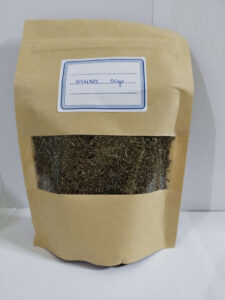The miraculous rosemary
The name of the plant ‘rosemary’ is a combination of the words tree and frankincense, while its Latin name Rosmarinous means rose of the sea. Rosemary (Rosmarinus officinalis L.) belongs to the family Lamiaceae.It is an aromatic, bushy plant and is a typical species of Mediterranean flora. Its flowering period is prolonged and gradual from April to August, but it flowers all year round.
The leaves of the plant are marketed as fresh or dried dew or the essential oil of the plant is sold. The latter is produced by steam distillation of the leaves and flowers of the herb, which are collected in the period from spring to late autumn.

How is it used?
Rosemary is used in cooking as a flavouring, as well as in the production of infusions. Its oil, which is rich in phenolic components such as phenolic acids and flavonoids, is used in the food and cosmetics industry, as well as in aromatherapy.
What are its actions?
The decoction fights diarrhea and hair loss, and is indicated for, among other things, atony, headache, colds, overwork, exhaustion and depression. It is recommended for stomach cramps and bloating, opens up the appetite and causes the secretion of gastric fluids.
1.Antimicrobial action
It has antimicrobial activity and even until the beginning of the 20th century it was used as an antiseptic in French hospitals.More specifically, research has shown that a minimal concentration of rosemary essential oil was needed to inhibit the growth of various pathogenic organisms such as E. Coli
2.Bactericidal activity.
In addition, it has bactericidal activity, since it was found to inhibit six microorganisms that commonly spoil meat, and antifungal activity, since it was shown by research to partially inhibit the growth as well as the production of toxins by various fungi.
3.Antioxidant action
At the same time, it has antioxidant activity. As is well known, free radicals have been associated with various biological phenomena such as inflammation, ageing, carcinogenesis. The antioxidant properties of rosemary extracts are based on its phenolic components.
4.Anti-cancer properties
Many of the components of the plant have shown its anti-cancer properties in in vitro and in vivo models. Another property of rosemary essential oil is the enhancement of cognitive function.
5.Improved memory and concentration
It was discovered that it can activate the sympathetic nervous system, improving the quality of memory, concentration ability, and mood of individuals.
6.Glucose and cholesterol reduction
Apart from all these, recent studies have found that it can lower blood glucose and cholesterol levels and help in weight control.
What do the surveys show?
Research in mice has shown that including rosemary in a high-fat diet can reduce body weight by more than 60%, compared to animals fed a high-fat diet alone.Recent research and previous publications confirm the role of rosemary in carbohydrate and lipid metabolism and suggest that rosemary may serve as a potential hypoglycaemic and hypolipidemic agent.
In conclusion
We find that rosemary, in addition to being a staple herb in Mediterranean cuisine, is also a miraculous herb. Due to the properties mentioned that it possesses, you need to include it in your daily diet as it goes perfectly with lemon meats and baked potatoes; it also flavours bread, beef, lamb, game, fish, seafood, omelettes, soups, sauces and vegetables wonderfully.






Reviews
There are no reviews yet.